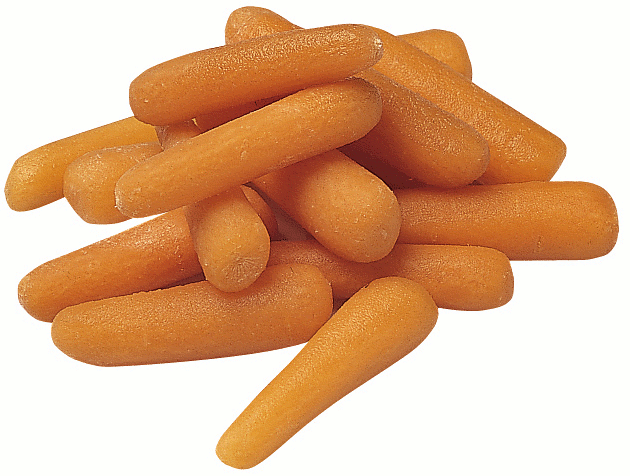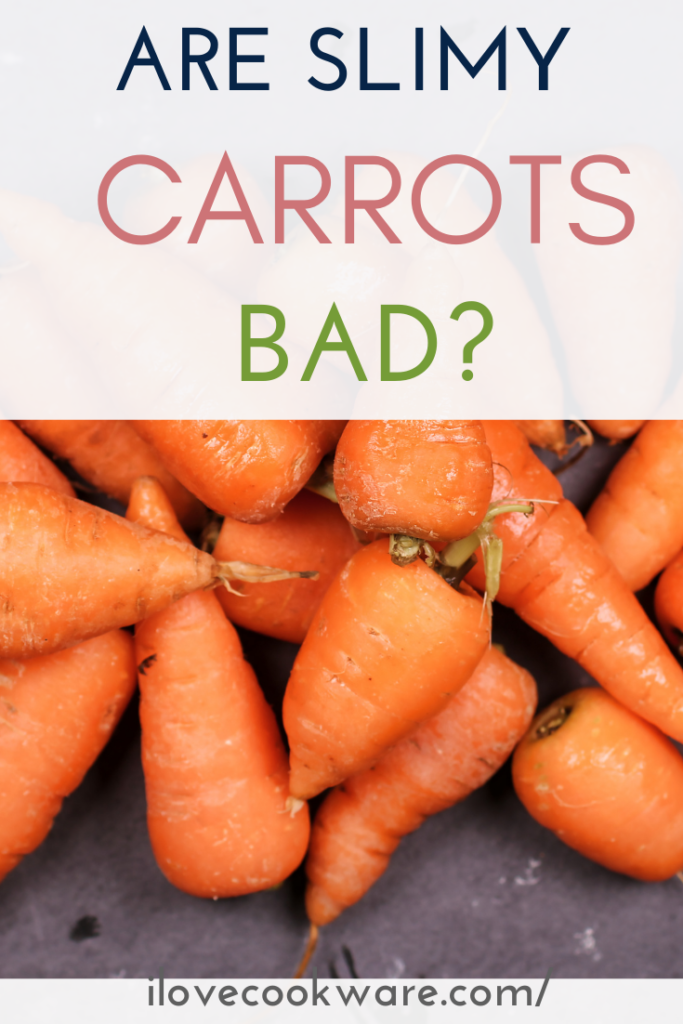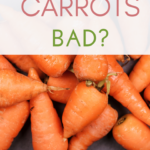Have you ever opened a brand new bag of baby carrots, and they are slimy? I’m sure you then check the date on the slimy carrots. Lo and behold the date is good; they are not expired. So why are your carrots slimy? We will go into detail on the reasons behind slimy carrots and what you should do.
First, people drive the carrots to the processing plant in a truck; they are put in icy water and sorted by thickness. Carrot harvesting is an exciting process that starts with the large carrots being machine-cut into 2-inch sections to make baby cuts. Next, they are scraped down to size and rounded at their ends. If any of these steps fail, you may end up with carrots with a slimy bacterial film once after packaging. If the truck that drives them to the processing plant is not cold enough, the carrots will be at a temperature that could promote bacterial growth.
Just like there is a process for how to tell if ginger is bad, carrots have their own unique way of showing us they are bad.

Are Slimy Carrots Bad?
Slimy carrots are bad. The slime on carrots involves an overgrowth of Leuconostoc gelidum and Leuconostoc gasicomitatum strains of the lactic acid bacterium. (LAB) They are gram-positive, non-motile, non-sporulating, facultatively anaerobic psychrotrophic LABs. Most times, they are associated with vegetable spoilage, especially vegetable products that are vacuum-packed.
Carrot spoilage can be from organic debris or soil on the roots, contaminating the machinery when the baby carrots are processed. The degree of produce bruising from mechanical harvesting, pre-storage washing, the length of time we keep carrots, and bacteria play a significant role in slimy carrots.
Since many baby carrots are either treated with low doses of irradiation or chemical treatments like washing them with chlorinated water or applying a fungicide, I choose not to eat them. Instead of buying prepackaged baby carrots that often succumb to carrot slime, I prefer to use a carrot shredder and prepare whole carrots myself.
Are your baby carrots slimy? We can help! Do not eat slimy baby carrots; they can make you sick.
Do Baby Carrots Go Bad?
Yes, a slimy carrot means that it is terrible, and it’s not ok to eat a slimy carrot.
We ship carrots in refrigerated containers and, once they arrive at processing plants, are exposed to higher temperatures that promote bacterial growth. The conditions under which we keep carrots in supermarkets are far from ideal. When it comes to slimy carrots, one must err on the side of caution and throw them out.
Keep in mind that freezing carrots before they go bad is a great way to extend their life.
Why Are My Carrots Slimy?
Carrots are slimy due to a film caused by bacteria. The slimy carrots are because of L. gelidum and L. gasicomitatum bacteria strains. These two strains can produce slime; it forms when the carrots are not kept cold enough before consumption. Baby carrots are not, in fact, young carrots; it is just a product name given to carrots that are machine processed. Baby carrots are regular carrots that are peeled and processed; this system causes the new cut surfaces to attract more bacteria and go bad faster.
How to Keep Baby Carrots from Getting Slimy
- Use your baby carrots faster; use the baby carrots that you buy in the supermarket within one week or less. If you leave them sitting in the fridge inside of the plastic bag that they came in, chances are they are forming slime.
- Check the date before you purchase them. Checking the date is not guaranteed that your baby carrots will be slime-free, but the chances are higher.
- When you get home, remove the baby carrots from the bag, pat them down with a paper towel, and place them in a new dry container.
- Instead of buying baby carrots in a bag, make your own. Baby carrots are not special carrots; they are just regular carrots that we process into a quick and easy snack.

How To Make Baby Carrots At Home
Slice them up the night before you are going to use them. Making your baby carrots will ensure that there is no slime.
- Wash your whole carrots with a good vegetable wash. Doing this before you peel them will ensure you are washing away any bacteria. You are making the carrots from whoever bagged them or handled them at the supermarket.
How Long Do Carrots Last Past Best By Date?
How long baby carrots last all depends on how people handle them before you purchase them. Is the packaging plant where they shape the baby carrots sanitary? Was the transport vehicle cold enough?
Is Slimy the Same as Moldy?
No. The slimy carrots are not moldy. A slimy carrot is a sign of spoilage in a vegetable product. There’s every chance that the slimy carrots will make you sick if you eat them. Mold on produce is easier to spot and remove than slime.
If you see mold on your baby carrots, you need to dispose of them because mold is not safe to eat. If a food product is soft and damp, then the mold can penetrate the center of the food, causing the entire thing to be inedible. Many molds have root threads that dive deep into the center of the food product. You will see the spores on the surface, but what you won’t see are the moldy root threads that can also make you sick.
Some people report that they just cut off the moldy section and eat the rest. Researching the science behind how mold spreads, you will see how the mold will contaminate the entire food product. The safest thing to do is not eat baby carrots or other food products that have mold growing on the surface.
Are slimy Carrots Safe?
No, they are not safe. We can link slimy carrots with cases of food poisoning and gastroenteritis. The slimy carrots are not a good idea to eat; they can make you sick. A biofilm covers slimy carrots.
Can Slimy Carrots Be Washed?
Some people have said that there is slime on when they open a bag of baby carrots. If they are not expired, some people have said they just washed them. Washing slimy carrots will not remove the bacterial film. If the carrots have a slimy film, then toss them.
How to Store Baby Carrots?
The main thing you want to do is to make sure the humidity level of the carrots is low; when they become wet, the slime will form.
- Take them out of the bag.
- Check them for slime.
- Do not wash the baby carrots before storing them in your container.
- Use a container or vegetable bag like the Debbie Meyer veggie bag that is clean a dry. Making sure it is dry is crucial to keeping the baby carrots fresh for a more extended amount of time.
- If they seem to be fresh and not slimy, then wrap them in a paper towel.
- Place the carrots in the coldest part of your refrigerator.
- Keeping them very cold is the key to not allowing the bacterial slime to form.
Can you Boil Slimy Carrots?
Some people will cut off the outer portion of the slimy baby carrot and just use the inner part. The problem with this method is that you will be contaminating your knife and cutting board with bacterial slime. The safest thing to do with slimy carrots is to throw them in the garbage, and it’s better to be wasteful than get yourself sick by eating slimy carrots.
How to Freeze Baby Carrots
Only freeze fresh baby carrots, not expired, and not slimy. There is no need to pre-wash the baby carrots, and you do not want to add moisture which can cause them to get ice crystals in the freezer and eventually burn faster.
- Open your bag of baby carrots.
- Inspect each carrot for slime.
- If they look good, you can place them into an airtight, freezer-safe container.
- Use the carrots within three months, so they do not get freezer burn.
Conclusion for Slimy Carrots – What’s the Deal?
Slimy carrots are a sign of spoilage in a vegetable product. If you find slimy or moldy baby carrots, don’t eat them! They might make you sick, and they’ll contaminate your knife and cutting board with biofilm. To prevent slime from forming on fresh baby carrots, try storing them dry without washing them first, wrapping the paper towel around the carrot to keep them dry as well as cool (refrigerator). Humidity is what starts the process of bacteria growth.
The slime is bacterial growth on the carrots. And yes, it makes the carrots unsafe to eat. Even if they do not look bad, it’s best to return them to the supermarket or toss them into the compost pile.

